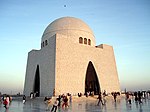Mai Kolachi
| Part of a series on the |
| History of Karachi |
|---|
 |
| Prehistoric period |
| Ancient period |
| Classical period |
| Islamic period |
| Local dynasties |
| British period |
| Independent Pakistan |
Mai Kolachi was a Sindhi hindu fisherwoman who settled near the delta of the Indus River in the oldest area of Karachi to start a community.[1][2] The village was named after her for her bravery, who jumped into the sea to save her son.[1][3] Kolachi and this community was later developed into the modern city of Karachi, Sindh, Pakistan.
History[edit]
"The Moriro Mirbahar and the Mangarmach" is an ancient Sindhi folktale about a fisherwoman named Mai Kolachi and her sons. There are different variations of the story. The event of the story is said to occur in 11th century in the rule of Soomra dynasty, it is also written by the famous Sindhi sufi poet Hazrat Shah Abdul Latif Bhittai.[4] The story goes:
There was a small fishing village in old Karachi, where a lady named Mai Kolachi lived with her seven sons, the youngest was Moriro who was handicapped and could not walk properly, the other children were healthy who used to go for catching fish in the sea every morning, while Moriro stays at home with her mother, he also wanted to go for catching fishes with his brothers but due to his condition he was not taken by his brothers.[5]
One morning when his brothers were preparing to go for fishing the weather got extreme and dangerous, but for livelihood they had to go, and while sailing the weather worsen and a huge crocodile, Shark or a big whale emerged out of sea and gulped the boat along with boys, the boys didn't return back for few days their mother and Moriro waited for them, after a week the mother and Moriro got worried about their safety, the fisherfolk of the village got convinced that the boys might have been killed by the Mangarmach (crocodile). But Moriro and his mother did not lose hope, and decided to bring them back, Moriro knew if he went into the sea he could also get eaten by the monster, so he thought of building an iron-cage with sharp spikes around it and tied it with ropes the ropes other end was tied into the necks of two bulls. He locked himself into the cage asked the villagers to throw iron cage into sea, he also carried a sharp dagger with him.[6]
Moriro in Iron cage swim into sea he reaches to a place where the monster was waiting for prey, as soon as Moriro reached near the monster, it attacked and eat the iron cage but the sharp spikes of iron cage injured the mouth of monster and it could sallow it, while Moriro attacked the monster with his dagger, and eventually he succeeded in killing it. The enmeshed crocodile in cage with Moriro inside were pulled out of sea by bulls and the villagers. When returned back, everyone triumphantly applaud the bravery of Moriro, he then tore the belly of monster and took the remains of his brothers and buried them at Gulbai chowk in Keamari where their graves still present, while the graves Moriro and his mother Mai Kolachi are in the Boultan market.[7][5][6]
See also[edit]
References[edit]
- ^ a b "Mai Kolachi and after | Footloose | thenews.com.pk". www.thenews.com.pk. Retrieved 2024-05-13.
- ^ Zimring, Carl A.; Rathje, William L. (2012-02-29). Encyclopedia of Consumption and Waste: The Social Science of Garbage. SAGE. ISBN 978-1-4129-8819-3.
- ^ Khalid, Haroon (2022-12-26). Walking With Nanak. Penguin Random House India Private Limited. ISBN 978-93-5492-847-5.
- ^ Sayed, Durreshahwar (1988). The Poetry of Shah Abd Al-Latif. Sindhi Adabi Board.
- ^ a b Askari, Sabiah (2015-10-05). Studies on Karachi: Papers Presented at the Karachi Conference 2013. Cambridge Scholars Publishing. ISBN 978-1-4438-8450-1.
- ^ a b Sadaf, Shazia; Kanwal, Aroosa (2023-09-26). Contemporary Pakistani Speculative Fiction and the Global Imaginary: Democratizing Human Futures. Taylor & Francis. ISBN 978-1-000-93692-6.
- ^ "City Secret – Moriro Mirbahar and his brothers' graves, Gulbai Chowk". The Karachi Walla. 2019-07-13. Retrieved 2024-05-13.
